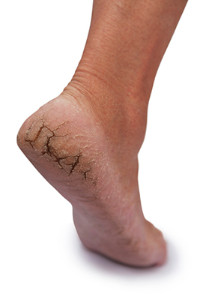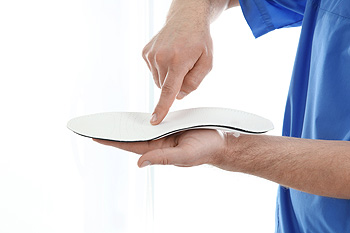
Lansdowne, PA
(610) 626-3338

Lansdowne, PA
(610) 626-3338
The importance of properly taking care of your feet is crucial to overall foot health, and it amplifies as the aging process occurs. Research has shown women to have approximately four times as many foot conditions than men, and this may be due to wearing high heels for many years, which may not allow adequate room for the toes to move about in. Aging may cause the feet to change sizes, and this may be a result of the feet becoming flattened and spread out as time evolves. Wearing shoes that do not fit properly can cause corns to form, and this is mainly because of increased friction the toes may bear. Additionally, a fungus may develop that is known as Athlete's foot, and this is extremely contagious and may be prevented by wearing appropriate shoes in public pools and surrounding areas. It is suggested to consult with a podiatrist for additional information on how to avoid potential foot ailments in elderly people.
Proper foot care is something many older adults forget to consider. If you have any concerns about your feet and ankles, contact Dr. George Yarnell from Pennsylvania. Our doctor can provide the care you need to keep you pain-free and on your feet.
The Elderly and Their Feet
As we age we start to notice many changes in our body, but the elder population may not notice them right away. Medical conditions may prevent the elderly to take notice of their foot health right away. Poor vision is a lead contributor to not taking action for the elderly.
Common Conditions
Susceptible Infections
Diabetes and poor circulation can cause general loss of sensitivity over the years, turning a simple cut into a serious issue.
If you have any questions please feel free to contact our office located in Lansdowne, PA . We offer the newest diagnostic and treatment technologies for all your foot and ankle needs.
 Many people who enjoy walking barefoot or wearing flip-flops during the summer months may be surprised to learn that there may be consequences that can follow as a result of this. The skin may become dry, calluses may possibly form, and fissures in the skin of the heels, known as cracked heels, may develop. If the cracks in the skin should bleed, severe pain, discomfort, and infection may accompany this condition. There may be remedies that can be practiced to prevent and relieve extremely dry skin, and these may include washing and drying the feet thoroughly followed by utilizing a good moisturizer. At this point, it is suggested to wear socks while sleeping for the night, and this may aid in healing painful fissures. If you would like additional information about how to treat cracked heels, it is advised to consult with a podiatrist who can discuss the best options for you.
Many people who enjoy walking barefoot or wearing flip-flops during the summer months may be surprised to learn that there may be consequences that can follow as a result of this. The skin may become dry, calluses may possibly form, and fissures in the skin of the heels, known as cracked heels, may develop. If the cracks in the skin should bleed, severe pain, discomfort, and infection may accompany this condition. There may be remedies that can be practiced to prevent and relieve extremely dry skin, and these may include washing and drying the feet thoroughly followed by utilizing a good moisturizer. At this point, it is suggested to wear socks while sleeping for the night, and this may aid in healing painful fissures. If you would like additional information about how to treat cracked heels, it is advised to consult with a podiatrist who can discuss the best options for you.
Cracked heels are unsightly and can cause further damage to your shoes and feet. If you have any concerns, contact Dr. George Yarnell from Pennsylvania. Our doctor can provide the care you need to keep you pain-free and on your feet.
Cracked Heels
Cracked heels appear unappealing and can make it harder for you walk around in sandals. Aside from looking unpleasant, cracked heels can also tear stockings, socks, and wear out your shoes. There are several methods to help restore a cracked heel and prevent further damage.
How Do You Get Them?
Dry skin is the number one culprit in creating cracked heels. Many athletes, walkers, joggers, and even swimmers suffer from cracked heels. Age and skin oil production play a role to getting cracked heels as well.
Promote Healing
Over the counter medicines can help, especially for those that need instant relief or who suffer from chronic dry feet.
Wear Socks – Wearing socks with medicated creams helps lock in moisture.
Moisturizers – Applying both day and night will help alleviate dryness which causes cracking.
Pumice Stones – These exfoliate and remove dead skin, which allows for smoother moisturizer application and better absorption into the skin.
Change in Diet
Eating healthy with a well-balanced diet will give the skin a fresh and radiant look. Your body responds to the kinds of food you ingest. Omega-3 fatty acids and zinc supplements can also revitalize skin tissue.
Most importantly, seek professional help if unsure how to proceed in treating cracked heels. A podiatrist will help you with any questions or information needed.
If you have any questions, please feel free to contact our office located in Lansdowne, PA . We offer the newest diagnostic and treatment technologies for all your foot care needs.
 Foot pain may occur for several different reasons. Helpful aids may include wearing orthotics, which may alleviate a portion of the pain and discomfort. They are described as an insert that is placed inside the shoes and may provide the additional support and stability that is needed. There are specific kinds of orthotics that are used, and the correct type that is needed is generally determined by the type of foot pain that is experienced. Some of the conditions that are treated with these devices may include plantar fasciitis, bunions, or rheumatoid arthritis. If you have foot pain and would like additional information about the benefits of orthotics, it is suggested to consult with a podiatrist who is able to provide the answers you are seeking.
Foot pain may occur for several different reasons. Helpful aids may include wearing orthotics, which may alleviate a portion of the pain and discomfort. They are described as an insert that is placed inside the shoes and may provide the additional support and stability that is needed. There are specific kinds of orthotics that are used, and the correct type that is needed is generally determined by the type of foot pain that is experienced. Some of the conditions that are treated with these devices may include plantar fasciitis, bunions, or rheumatoid arthritis. If you have foot pain and would like additional information about the benefits of orthotics, it is suggested to consult with a podiatrist who is able to provide the answers you are seeking.
If you are having discomfort in your feet and would like to try orthotics, contact Dr. George Yarnell from Pennsylvania. Our doctor can provide the care you need to keep you pain-free and on your feet.
What Are Orthotics?
Orthotics are inserts you can place into your shoes to help with a variety of foot problems such as flat feet or foot pain. Orthotics provide relief and comfort for minor foot and heel pain but can’t correct serious biomechanical problems in your feet.
Over-the-Counter Inserts
Orthotics come in a wide variety of over-the-counter inserts that are used to treat foot pain, heel pain, and minor problems. For example, arch supports can be inserted into your shoes to help correct overarched or flat feet, while gel insoles are often used because they provide comfort and relief from foot and heel pain by alleviating pressure.
Prescription Orthotics
If over-the-counter inserts don’t work for you or if you have a more severe foot concern, it is possible to have your podiatrist prescribe custom orthotics. These high-quality inserts are designed to treat problems such as abnormal motion, plantar fasciitis, and severe forms of heel pain. They can even be used to help patients suffering from diabetes by treating foot ulcers and painful calluses and are usually molded to your feet individually, which allows them to provide full support and comfort.
If you are experiencing minor to severe foot or heel pain, it’s recommended to speak with your podiatrist about the possibilities of using orthotics. A podiatrist can determine which type of orthotic is right for you and allow you to take the first steps towards being pain-free.
If you have any questions please contact our office located in Lansdowne, PA . We offer the newest diagnostic and treatment technologies for all your foot and ankle needs.
Read more about Foot Orthotics Pregnant women may experience swollen feet and ankles in addition to their growing bellies as a result of their expanding uterus. The excess fluid that causes the ankles to swell acts as a nurturing agent and may collect in the tissues of the body. This may occur due to blood flow that may typically increase because the growing child may often put pressure on the pelvic veins. If you are experiencing swollen feet and ankles, there are several ways that may possibly control this uncomfortable condition. These may include not standing or sitting for extended periods of time, performing gentle exercises and stretches that may aid in improving circulation, wearing shoes that are comfortable and fit correctly, in addition to drinking plenty of fresh water on a daily basis. Research has shown the feet may become larger during pregnancy, and it may be beneficial to wear the correct shoe size. It’s suggested to speak with a podiatrist if you have questions about how pregnancy can affect your feet.
Pregnant women may experience swollen feet and ankles in addition to their growing bellies as a result of their expanding uterus. The excess fluid that causes the ankles to swell acts as a nurturing agent and may collect in the tissues of the body. This may occur due to blood flow that may typically increase because the growing child may often put pressure on the pelvic veins. If you are experiencing swollen feet and ankles, there are several ways that may possibly control this uncomfortable condition. These may include not standing or sitting for extended periods of time, performing gentle exercises and stretches that may aid in improving circulation, wearing shoes that are comfortable and fit correctly, in addition to drinking plenty of fresh water on a daily basis. Research has shown the feet may become larger during pregnancy, and it may be beneficial to wear the correct shoe size. It’s suggested to speak with a podiatrist if you have questions about how pregnancy can affect your feet.
Pregnant women with swollen feet can be treated with a variety of different methods that are readily available. For more information about other cures for swollen feet during pregnancy, consult with Dr. George Yarnell from Pennsylvania. Our doctor will attend to all of your foot and ankle needs.
What Foot Problems Can Arise During Pregnancy?
One problem that can occur is overpronation, which occurs when the arch of the foot flattens and tends to roll inward. This can cause pain and discomfort in your heels while you’re walking or even just standing up, trying to support your baby.
Another problem is edema, or swelling in the extremities. This often affects the feet during pregnancy but tends to occur in the later stages.
How Can I Keep My Feet Healthy During Pregnancy?
If you have any questions please feel free to contact our office located in Lansdowne, PA . We offer the newest diagnostic and treatment technologies for all your foot and ankle needs.